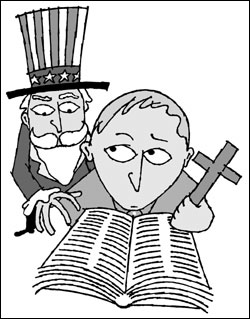THERE’S A PARTICULAR image that conveys sharply, for Americans, the soul-deadening oppression of what life was like under the Taliban, or continues to be like in any fundamentalist Muslim theocracy. It’s the notion of dozens of school-aged kids, bundled into a primitive classroom, given no education other than hour upon hour of monotonous repetition of the Koran.
That approach to public education might be on the verge of being ruled constitutional by the U.S. Supreme Court.
The case with which such a ruling might come is that of Joshua Davey, a Spokane student who in 1999 was awarded a $1,125 scholarship from the state of Washington to help cover the costs of his college education. Davey met all of the state’s criteria for eligibility: He was enrolled, he had finished in the top 10 percent of his high-school class, and his family earned less than 135 percent of the state’s median income.
Except that he was enrolled in Northwest Collegean accredited, private, Assembly of God-run college in Kirkland. One of his majors was theology, and he intended to train to be a pastor.
Davey was disqualified under a provision in Washington’s constitution that bars public aid to students studying religion. He sued. If there is any sense at all among the nine Supreme Court justices, Davey will win, because having the state choose the allowable content in a student’s curriculum should be no more constitutional than having the state determine allowable speech. And, in fact, this same Supreme Court already ruled, in a 2001 case from New York, that school districts cannot bar religious student groups from using public facilities after hours based solely on the groups’ content or sponsorship.
THE CASE APPEARS, at least on the surface, to be a slam-dunk for Davey. But if he wins, all you-know-what will break out. For want of a thousand-dollar scholarship, the whole secular kingdom could be lost.
That’s because constitutional prohibitions on public aid for religious instruction are the law in 37 states. These so-called “Blaine Amendments,” enacted in the late 1800s by Protestants fearful of public funding for Catholic schools, set a higher bar for separation of church and state than the federal system does. The states’ amendments have been a significant barrier to the enactment of voucher systems, wherein public money for education is given to families that choose to send their kids to private schoolsreligious ones, for example.
Davey’s case does not undermine public education directly. But there is nothing in the U.S. Constitution that guarantees public educationlet alone what the content should be. Each is a product of generations of public-policy decisions based on the idea that a well-educated populace is in the public interest, to the degree that it’s worth taxing ourselves to pay for it. The first public school in America was established in Boston in 1635, and defining “well-educated” has been giving school board members headaches ever since.
Our nearly 400-year-old public consensus on the value of education is in no danger. What Davey’s case speaks to is the debate common to controversies like the teaching of creationism, the incorporation of explicitly religious values (“life begins at conception”) into public law, or the posting of the Ten Commandments in a public space. Can our government underwrite an institution that promotes religion or promotes a religious belief? Can the state also ban an individualsay, a teacher, paid indirectly by the statefrom saying what she or he wishes, from teaching scripture, for example?
IF THE COURT decides government can exert financial or other influence on religious teaching, the next question becomes whether government should. This is the slippery slope that leads to theocracies and, as the pitch steepens, to fundamentalist tyrannies run by the Talibans or Ayatollahs of the world. The percentage of people in the United States who profess religious belief is higher than that of any other Western democracycomparable, in fact, to many Islamic countries. As to whether religion should be a part of the state’s agenda, were the decision left to politicians, administrators, or a popular vote, the outcome could easily change from generation to generation.
There’s no reason to believe, if Joshua Davey wins his case, that there will be a sudden rush to religious public instruction in America, and thence to compulsory worship. But there’s also no reason to believe that if they have the freedom to do so, in 30 years a new generation couldn’t decide differently.
As a result of his prominent lawsuit, Davey set aside his religious studies. He’s now at Harvard Law School.







